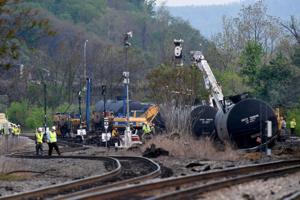Crude Oil Rail Terminal Operator Files for IPO
Transporting crude oil
from the Bakken field in the Upper Midwest and the oil sands of Alberta
has become a big business for railroads. As long as pipeline
transportation remains constrained, railroads will continue to offer the
best solution for producers. With that in mind, a company called USD
Partners L.P. on Friday filed for an initial public offering to raise $150 million.
The company currently owns a crude-by-rail terminal in Hardesty,
Alberta, with capacity to load two 120-car unit trains per day. USD
Partners also owns ethanol terminals in San Antonio, Texas, and West
Colton, Calif...... Read more here
The frequency and
volume of Bakken crude rail shipments are driven by oil production in
North Dakota that is second only to Texas in the U.S. Production there
rose from 81,000 barrels a day in 2006 to 900,000 barrels a day last
year.
With production exceeding pipeline capacity, “rail became attractive because of the location and the fact there is a ready market for (light crude oil) on the East Coast,” said Sandy Fielden, an analyst at RBN Energy in Houston..... more here
With production exceeding pipeline capacity, “rail became attractive because of the location and the fact there is a ready market for (light crude oil) on the East Coast,” said Sandy Fielden, an analyst at RBN Energy in Houston..... more here
Rail safety measures due in Virginia after oil-train wrecks
The same day a CSX
train carrying almost 3 million gallons of crude oil derailed in
downtown Lynchburg, federal investigators took a sample of oil at a rail
transfer terminal 1,750 miles away in North Dakota.
The oil sampled in North Dakota was owned by Plains Marketing, the same Texas company that owned roughly 30,000 gallons of crude oil that either burned in a fiery, black plume above Lynchburg or gushed into the James River from one of three tanker cars that tumbled down the riverbank at 2 p.m. April 30.
Federal tests showed the North Dakota oil was highly flammable and belonged in the most hazardous category of flammable liquids under federal regulations.....
....Jewell, the Richmond fire captain, said CSX won’t tell him the worst-case scenario of an oil-train derailment in Richmond, but he has his own blueprint — a map that shows concentric evacuation zones of a quarter- and half-mile around the triple rail crossing in Shockoe Bottom.
Emergency guidelines would require evacuation of people in a half-mile radius if one rail car caught fire and an additional quarter-mile for every other car that is “impinged” by flames that could cause a vapor explosion. \more here
The oil sampled in North Dakota was owned by Plains Marketing, the same Texas company that owned roughly 30,000 gallons of crude oil that either burned in a fiery, black plume above Lynchburg or gushed into the James River from one of three tanker cars that tumbled down the riverbank at 2 p.m. April 30.
Federal tests showed the North Dakota oil was highly flammable and belonged in the most hazardous category of flammable liquids under federal regulations.....
....Jewell, the Richmond fire captain, said CSX won’t tell him the worst-case scenario of an oil-train derailment in Richmond, but he has his own blueprint — a map that shows concentric evacuation zones of a quarter- and half-mile around the triple rail crossing in Shockoe Bottom.
Emergency guidelines would require evacuation of people in a half-mile radius if one rail car caught fire and an additional quarter-mile for every other car that is “impinged” by flames that could cause a vapor explosion. \more here





.jpg)
.jpg)



